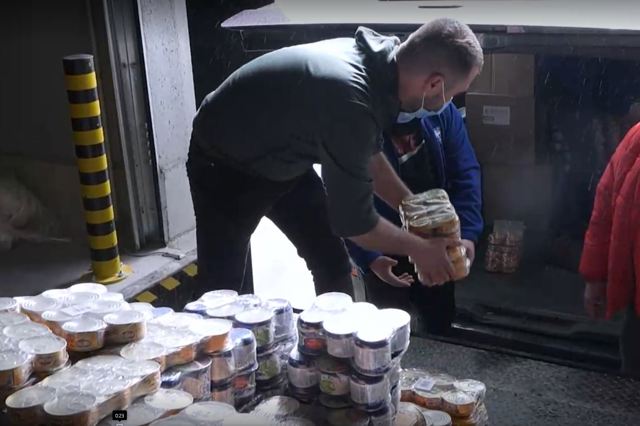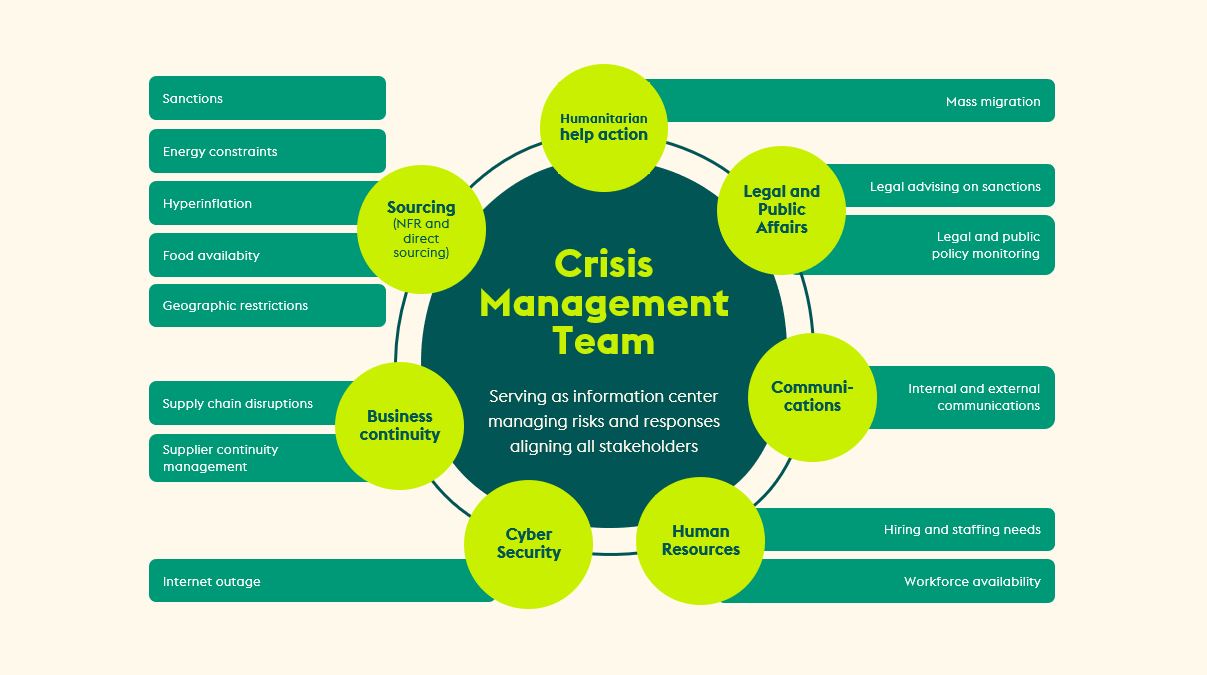
Crisis management governance
Our enterprise risk management program provides Ahold Delhaize with a periodic and comprehensive understanding of the company’s key business risks and the management practices, policies and procedures in place to mitigate these risks. Ahold Delhaize recognizes strategic, operational, financial and compliance/regulatory risk categories (for more information on how we manage our risks please see our Annual Report 2021). Unfortunately, some risks are hard to predict and arise unexpectedly as disruptive events that threaten to harm the organization or its stakeholders. In these situations, Ahold Delhaize’s crisis management procedure is triggered. This helps us to deal with a sudden and significant negative event or crisis that can occur as a result of an unpredictable event or an unforeseeable consequence of some event that had been considered a potential risk.
All brand- level incidents and crisis situations are handled by the brand or continental crisis management teams, including crisis communication activities. A topic involves GSO level teams when it relates to the corporate strategy or affects / may affect the Ahold Delhaize group.
We are deeply saddened by the war in Ukraine and strongly condemn this act of military aggression in breach of international law and order. Already, thousands of lives have been lost in Ukraine, and millions of livelihoods have been disrupted through displacement, lost homes and lost incomes. We hope de-escalation of violence can be realized as soon as possible to save further lives and restore peace. Like so many others, we are shocked by the unfolding humanitarian tragedy and the consequences of this war. As in any conflict, uncertainty is high. It is unclear how the military situation, the political process and the countermeasures around the world will play out – in either the shorter or longer term. However, it is already certain that, as a consequence of the economic impact of the crisis on energy and food markets, disruptions will affect many in Europe and beyond. While we do not have operations in Ukraine or Russia our company will be affected as well as part of these wider economic impacts.
As mentioned above, while our Group does not have any operations in Ukraine or Russia, the Group is affected by the wider macro-economic consequences of the conflict and might be additionally impacted if the situation develops further.
Our sourcing teams are working hard to prepare for any current and future impacts. Our Not for Resale Sourcing team procures all the goods and services for Ahold Delhaize’s brands in Europe to ensure that our stores run smoothly and safely. Our Direct Sourcing team sources own brands, national brands and fresh products together with the Ahold Delhaize brands. These two teams worked alongside the brand-level Crisis Management Teams (CMT) and the GSO Crisis Management Team (GCMT) to deploy a “Plan Ahead Team” that closely monitors the impact of the situation in Ukraine on our supplier landscape and Not for Resale goods and services and commodity products in Europe. The impact of the war in Ukraine demonstrates itself in three distinct ways: upward price pressure, increased logistical challenges and availability issues in the whole supply chain.
Energy markets reacted fiercely to the tension and uncertainty caused by the crisis in Ukraine. This has impacted the price of petroleum-based products and raw/building materials coming from energy-intensive industries (such as glass, steel and paper). Logistical challenges have increased on the back of post-covid dynamics and further disrupted supply chains.
The dynamics described above put significant pressure on the expected contribution of our sourcing teams to our Save for Our Customers program. The main focus of both the Not for Resale and Direct Sourcing teams is currently to ensure the availability of the consumer products, goods and services required to run our businesses. We rely on our strong network of incumbent suppliers to limit price pressure and safeguard availability. In addition, we continue to review the impact of different cost factors and our methods of managing them. We maintain close contact with our suppliers and are looking to make sure that all of our sourcing agreements provide the flexibility to act when new changes occur in the supply chain.
In the case of the crisis in Ukraine, the GCMT activated our crisis management procedure. This includes scenario planning, with assumptions on what the future will hold and how it will change our business environment over time. More precisely, our scenario planning identifies a specific set of uncertainties and different “realities” of what could occur in relation to the future of our business. All relevant workstreams are alerted and are working to define next steps and possible future scenarios to help us prepare.

Ahold Delhaize and its local brands care for the people and communities they serve. We are working globally and locally to support humanitarian relief efforts. Ahold Delhaize has donated €1 million to the Red Cross to provide humanitarian relief on the ground in Ukraine and in neighboring countries to support people fleeing the escalating violence. Our local brands are also offering emergency aid and assistance.